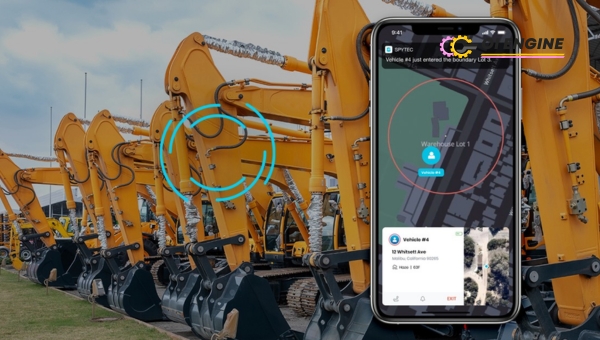Ever wondered how fleet tracking can revolutionize your operations? Fleet tracking improves productivity in ways you might not have imagined.
If you are looking to optimize efficiency in your business while cutting down on unnecessary costs, it is time to delve deeper into an underrated solution – fleet tracking systems!
Fleet tracking serves as a vital tool for businesses looking to streamline their operations, boost productivity, and increase profits.
It optimizes route planning, reduces fuel consumption, enhances safety measures, and improves customer satisfaction. When implemented correctly and fully utilized with its vast array of features, it paves the way toward operational efficiency.
What is Fleet Tracking?
In our constantly evolving business landscape, ensuring efficiency and productivity is crucial. This is where I found fleet tracking to be a game-changer.

Not familiar with it? Let’s dive in together and unravel its potential to improve productivity.
What is Fleet Tracking?
In simple terms, fleet tracking is a management system that keeps track of all your vehicles in real-time. Be it cars, trucks, or any other vehicle; no matter the size of your ‘fleet’, this tool allows you to follow their location accurately from anywhere at any time. It gives access to valuable insight into journey routes, fuel consumption, idle time, and much more.
Fleet tracking isn’t just about following dots on a map though; it’s an incredible tool that streamlines operations and provides critical business intelligence enabling informed decisions.
It involves the use of GPS technology allied with recognized mapping software sending data back to your central hub on all aspects of each vehicle’s journey.
How can Fleet Tracking Potentially Improve Productivity?
When harnessed correctly, fleet tracking holds the power not only to increase productivity but also to cut costs across various areas of business operations.
- Fuel Economy: By providing optimal routes for journeys and alerting about unnecessary idle times, this handy tool can considerably reduce fuel costs. Moreover, it assists in monitoring driver behavior that might impact consumption like aggressive driving or speeding thus enhancing overall productivity.
- Improved Security & Safety: Knowledge about every vehicle’s location reduces risks of theft or unauthorized use. Furthermore, real-time alerts for over-speeding or deviations from predefined routes aid in securing both assets and workers thereby resulting in greater overall efficiency.
- Operational Efficiency & Cost Reduction: With access to comprehensive data 24/7 such as mileage data or engine reports you’re always equipped with key insights that help cut down unexpected overheads that would otherwise go unnoticed benefiting bottom-line productivity.
- Improving Customer Satisfaction: By integrating fleet tracking with customer service, you can provide customers with accurate ETAs and faster response times which brings about a dramatic rise in client satisfaction.
- Maximising Equipment Functionality: In the world of predictive maintenance fleet tracker helps foresee potential failures before they turn into high-cost repairs. The system notifies updates on regular servicing schedules and part replacements to ensure your equipment is always at its functional best, leading to increased productivity.
Also Read: Truck Accident Statistics: Insightful Breakdown
What are the Advantages of Fleet Tracking in Enhancing Productivity?
Without a doubt, the pace and efficiency at which work gets done considerably impact a company’s bottom line.
One proven way to augment productivity is through fleet tracking. Not only does it maximize operational parameters but also ensures tangible business outcomes, making it an ideal choice for businesses with mobile assets.
Beyond streamlining operations by leveraging real-time data, what makes fleet management compelling is its proven potential to enhance productivity.
By providing a clear picture of what’s happening and where improvements can be made, it becomes easy to formulate strategic decisions aimed at driving growth.
Fuel Economy
The implementation of fleet tracking paves the way for optimal route planning. When the routes are pre-determined based on real-time traffic conditions and geographic terrain analysis, vehicles follow the best path avoiding congestion or mishaps.
This optimization leads to reduced fuel consumption significantly. Over time, less fuel usage translates into significant cost savings harnessing better overall productivity.
Furthermore, idling vehicles in heavy traffic or due to driver negligence can lead to unnecessary fuel burnout; this situation can be avoided when armed with fleet tracking insights.
Fleet managers can ensure drivers turn off engines during extended stops or follow advised routes helping conserve additional fuel.
Better Security and Safety
Strengthening security can never be overlooked as a priority in managing mobile assets; that’s precisely where fleet-tracking systems make their mark offering enhanced safety measures both for cargo and personnel aboard.
Its GPS apprised features serve as theft deterrents averting unauthorized use of vehicles while ensuring that they stay within designated geo-locations.
There’s another facet of improved safety realized through data-driven insights about driving behavior gathered from these systems like harsh braking, rapid accelerations, or violation of speed limits— all posing risks for accidents.
Consequently, permissions for preventive measures could drastically reduce such risks hence enhancing productivity by skipping downtime caused due to non-compliance or accidents.
Operational Efficiency & Cost Reduction
Fleet tracking assists in pinpointing inefficiencies or redundancies in business operations thus enabling a more streamlined work process.
From the dispatch of goods to the operation of mobile assets, data provided by these systems allows businesses to allocate resources more efficiently reducing overhead costs and maximizing profit margins.
Unforeseen repair expenses due to vehicle breakdowns pose significant disruption; however, with a fleet-tracking solution’s maintenance reminders and diagnostic reports unexpected repairs can be minimized.
The resulting cost-effectiveness is accompanied by continuous productivity sustenance which might have been impacted due to vehicle out-of-service episodes.
Improving Customer Satisfaction
Customer expectations are increasingly focused on prompt service delivery hence businesses need to deliver parcels faster than ever before.
With fleet tracking companies can precisely estimate arrival times keeping customers informed about their deliveries using real-time updates enhancing overall customer experience and satisfaction level.
Building customer loyalty cannot happen without providing a quality service; the ability to promptly respond to client queries with accurate information achieved through these systems ensures engagement per se and retains existing customers while attracting new ones.
Maximising Equipment Functionality
Equipment are valuable asset that assures smooth fleet operations; fleet tracking systems proactively introduce predictive maintenance measures that extend the equipment’s useful life ensuring optimal functionality each time it operates.
Predictive maintenance based on AI analyzes patterns that predict potential failures well before they turn into expensive repairs or replacements preventing downtime and fostering uninterrupted productivity at copious levels.
By doing so, equipment remains operational for longer periods equating to maximum asset utilization invariably boosting overall productivity magnitudes.
Also Read: Autonomous Trucking Revolution: The Future Rides On AI
What are the Common Challenges in Implementing Fleet Tracking?
Fleet tracking might seem like a straightforward solution, but it’s not always that simple. It requires careful planning and execution to integrate smoothly into an existing operation.

Without proper preparation, I’ve seen businesses face many challenges that hinder their intended productivity boost, instead causing frustration and inefficiency.
Considerate planning can help circumvent such troubles, but recognizing potential challenges before they become obstructive issues is key.
By being aware of the possible hurdles and preparing for them in advance, companies can ensure a smooth transition toward improved productivity through effective fleet tracking.
Hardware Installation
The first challenge commonly encountered is hardware installation. Choosing where and how to install fleet tracking devices in each vehicle might seem like a no-brainer; however, without careful consideration, this process could inadvertently disrupt regular operations or damage vehicles.
Selecting suitable installation points within vehicles is crucial to maintaining uninterrupted daily activities while achieving maximum functionality from the systems.
It’s all about finding the right balance between efficiency and efficacy. To improve productivity with fleet tracking, I would advise meticulous pre-planning of device placement, possibly with assistance from a professional installer.
Data Overload
Fleet management systems generate large amounts of data that can quickly become overwhelming if not properly managed- this is termed ‘data overload’. Processing this much data needs effective management strategies to fully utilize its potential benefits.
Toot my success here: Once I had implemented refined data management steps and procedures into my business structure -like creating different categories or tabs based on the significance and type of data-, it turned out to be tremendously helpful for dealing with extensive information volumes easily.
Integration with Other Platforms
Different businesses rely on different software platforms for their operations’ smooth running. Incorporating fleet tracking systems mustn’t impede these applications; rather it should ideally complement them or at the very least coexist peacefully!
Factor in what software you utilize regularly, and think about how the features of your chosen fleet management solution can support rather than disrupt them. Providers often offer support for integration- make sure to thoroughly discuss your business’s unique needs with them!
Understanding Fleet Management Trends
Keeping up-to-date with evolving trends in fleet management technology can be challenging. But it’s worth investing time and effort to understand these advancements continually. This understanding is pivotal for making informed decisions regarding upgrades or new implementations.
In a rapidly changing digital landscape, being outdated is not an option. It’s important to research current best practices for fleet management and integrate relevant updates into operations wherever possible.
Change Management
Fleet tracking systems bring about significant changes in daily operations, which could create resistance among some employees.
Successful implementation of such systems requires transparent communication about their importance, the potential benefits their introduction will reap, along with practical training on using these new systems efficiently.
Adopting a new technology does need guidance; my strategy is adopting an open-door approach where employees can freely raise concerns or queries regarding the change while patiently addressing each one has ultimately made way for successful system integrations in my organization.
After all, everyone becoming comfortable with the system is a core part of productivity improvement through fleet tracking!
Also Read: Self-Driving Vehicles: Top Cities & States at Greatest Risk
Selecting a Highly Effective Fleet Management Solution
When it comes to selecting a highly effective fleet management solution that can improve productivity, many factors come to my mind. It’s like choosing a new employee – you want something reliable, efficient, and beneficial to your business.

As I sift through different options, aspects such as the offered business model, pricing and warranties, alert systems and access points, usability, and necessary training are on top of my list.
And let’s not forget the potentiality for future innovation that should be present in any solution considered. Winning over employees to accept such new change is also an important consideration.
These considerations start from simple things like understanding different business models & installations but stretch as far as thinking about how this system can foster future innovation in your fleet tracking operations.
In my experience, addressing these six elements will help you choose the most highly effective fleet management solution.
Business Models & Installations
Taking into account various Business Models & Installations has always been crucial in all decision-making processes I’ve witnessed.
Each model comes with its own set of benefits – Some provide real-time tracking data while others offer robust analytical tools; The aim here should be to find out which one aligns with your specific operational needs best.
Installations require careful thought too! This is because the chosen model must seamlessly integrate with existing systems while avoiding any disruption during the installation process.
The way I see it: A properly integrated system can maximize efficiency while minimizing downtime; thus leading towards an improved productivity scenario all around!
Pricing & Warranties
It’s also worth considering Pricing & Warranties when deciding on what solution would work best for you – Think about it; You don’t want to blow your budget on an overly expensive system nor do you want to invest in something cheap but unreliable!
The key here is balance: First analyze associated costs with potential solutions vs their proposed benefits. A pricier system might save you more in the long run by reducing fuel costs, minimizing maintenance demands, and optimizing routes.
Warranties are equally as important as they provide a safety net against unforeseen faults or problems. For me, this provides an invaluable peace of mind.
Alert Systems & Access Points
In my opinion, a fleet management solution that sports robust Alert Systems & Access Points can be particularly effective.
After all, the sooner an issue is detected, the faster effective corrective action can be taken! – And that’s exactly how I intend to use such features to improve productivity!
Access points should also be secure yet user-friendly to ensure employees can easily monitor and manage the fleets without any hurdle; It all boils down to creating an environment where vehicles and their routes are tracked in real-time whilst any anomalies could trigger alerts for swift action.
Usability & Training
I cannot stress enough the importance of Usability & Training in a fleet management solution. It’s not just about having sophisticated features; it’s also about how easy they are to use and how well your staff can be trained to fully utilize them.
Training is an investment that, over time, leads to reduced operational errors and improved productivity. On top of that, an easy-to-use system eliminates confusion, lowers employee anxiety related to tech-adaptation and ultimately ensures smoother operations.
Winning Over Employees to Accept New Change
Winning over employees is a pivotal step when implementing changes such as introducing a new Fleet Management System.
I believe that getting them ‘on board’, both literally and figuratively is vital for ensuring the success of your new initiative.
For this reason, training sessions should not merely focus on functionality but should also explain the benefits this change would bring for them individually as well as collectively for the business.
Employing such strategies has helped me improve productivity through better user compliance every single time!
Fostering Future Innovation
Lastly but by no means least, fostering future innovation should be part of any viable fleet management strategy!
I’ve observed firsthand how adopting systems that are easily upgradeable or adaptable with evolving technologies has paid dividends in terms of maintaining effective fleet operations without requiring constant overhauls or replacements.
In today’s rapidly evolving world, future-proofing technology investments are simply good business practice!
So choosing solutions with potentiality for advancements will not only make your fleet operations more adaptable to coming trends but will also contribute towards improved business efficiency moving forward.
FAQs
How does fleet management increase productivity?
Fleet management boosts productivity by optimizing routes, reducing fuel costs, and enhancing operational efficiency. It also leverages predictive maintenance to keep equipment functional.
How can a transport tracking system improve operational productivity?
A transport tracking system improves operational productivity by providing real-time data about vehicle location and status. This information can be used for quick decision-making, thereby reducing downtime.
How do telematics improve productivity in fleet management by tracking?
Telematics increases productivity in fleet management through constant monitoring of vehicles on the road. It enables immediate feedback for drivers and helps reduce unnecessary idling or unauthorized use of vehicles.
What are the benefits of fleet management?
Fleet management offers multiple benefits such as improved fuel economy, better security & safety measures, enhanced customer satisfaction due to timely deliveries, and periodic maintenance that maximizes equipment functionality.
What is effective fleet management?
Effective fleet management involves comprehensive tracking systems capable of improving the overall workflow. The system must be easy to use, appropriately priced with warranty support, include alert systems & access points for monitoring, and have training for all employees.
Also Read: Car Hauler Insurance: Secure Your Transport
Conclusion
Fleet tracking plays a fundamental role in streamlining operations and boosting productivity. By implementing this technology, businesses can significantly save on fuel costs, amplify operational efficiency, enhance their customer service experience, and ensure better security.
Despite the challenges that might arise during its implementation process, choosing an effective fleet management solution with due consideration to business models, cost-effectiveness, alert features, and user-friendliness mitigates these concerns.
Ultimately, embracing fleet tracking presents immense potential for fostering future innovation and keeping your business abreast of next-generation advancements.
